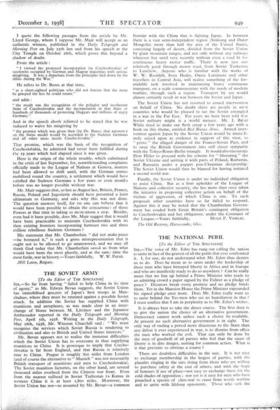THE SOVIET ARMY [To the Editor of THE SPECTATOR] SIR,—So
far from having " failed to help China in its time of agony," as Mr. Edwyn Bevan suggests, the Soviet Union has immobilised 400,000 of Japan's best troops in Man- chukuo, where they must be retained against a possible Soviet attack. In addition the Soviet has supplied China with munitions and aeroplanes, as was made clear in an inter- change of Notes between M. Litvinov and the Japanese Ambassador reported in the Daily Telegraph and Morning Post, April 5th, 1938. Writing in the Daily Telegraph, May 26th, 1938, Mr. Winston Churchill said : " We must recognise the services which Soviet Russia is rendering to civilisation and also to British and United States interests."
Mr. Bevan appears not to realise the immense difficulties which the Soviet Union has to overcome in thus supplying munitions to China. It is grotesque to imply that Czecho- slovakia is far from England, and that Russia is relatively near to China. Prague is roughly 800 miles from London (and of course the alternative to " Munich " was riot necessarily British transport of munitions and men to Czechoslovakia). The Soviet munition factories, on the other hand, are several thousand miles overland from the Chinese war front. Even from the nearest railhead in Soviet Turkestan to Kansu in western- China it is at least 1,800 miles. Moreover, the Soviet Union has not—as 'assumed by Mr. Bevan—a 'common
frontier with the China that is fighting Japan. In between there is a vast semi-independent region (Sinkiang and Outer Mongolia) more than half the area of the United States, consisting largely of desert, divided from the Soviet Union by giant mountain ranges, and not only without any railways whatever but until very recently without even a road fit for continuous heavy motor traffic. There is now just one relatively good through motor road, from Soviet Turkestan to Lanchow. Anyone who is familiar with the works of W. W. Rockhill, Sven Hedin, Owen Lattimore and other travellers in Central Asia, will realise something of the for- midable task involved in maintaining heavy continuous transport, on a scale commensurate with the needs of modern warfare, through such a region. Transport by sea would almost certainly result in war between the Soviet and Japan.
The Soviet Union has not resorted to armed intervention on behalf of China. No doubt there are people in mcst countries who would be pleased to see the Soviet entangled in a war in the Far East. For years we have been told that Soviet military might is a • world menace. Mr. J. Baler White tried to make our flesh creep a few years ago with a book on this theme, entitled Red Russia Arms. Armed inter- vention against Japan by the Soviet Union would be immeii- ately seized upon as evidence in support of this view, to " prove " the alleged danger of the Franco-Soviet Pact, and ' to sway the British Government into still closer sympathy with the Tokyo-Rome-Berlin triangle. It would also encourage Herr Hitler to proceed with his scheme for " liberating " the Soviet Ukraine and uniting it with parts of Poland, Ruthenia, and Rumania under a puppet pan-Ukrainian dictatorship. The Soviet Union would then be blamed' for having initiated a second world war.
Finally, the Soviet Union is under no individual obligation' to assist China. But as a firm upholder of the League of Nations and collective security, she has more than once taken the initiative in proposing collective action on behalf of the victims of aggression, of which China is one. To such proposals other countries have so far failed to respond. Against this it may be noted that the Chamberlain Govern- ment has evaded both Great Britain's . contingent obligation to Czechoslovakia and her obligations under the. Covenant of
the League.—Yours faithfully, HUGH P. VOWLES.
The Old Rectory, Harescombe, Glos.


























































 Previous page
Previous page